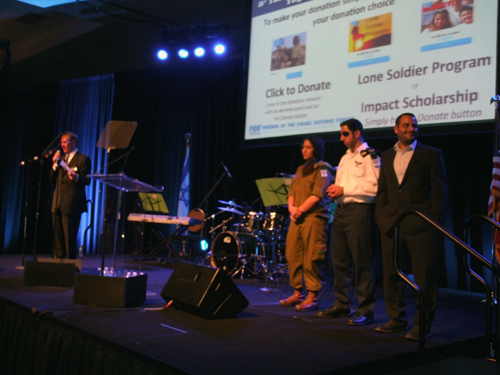
By Donald H. Harrison

SAN DIEGO–A salute Saturday evening, Jan. 25, to Israel’s Navy and a speech by its former commander Amihai Ayalon, who also is a past director of Israel’s Shin Bet security service, was not, as one might expect, dedicated to probing analysis of the external threats faced by the Jewish State, nor to a plea for more naval weaponry in response to the growing sea power of Israel’s adversaries.
Instead, more than 650 contributors attending a dinner at the Hilton San Diego Bayfront Hotel were treated to a warmly sentimental, even haimish, occasion at which speakers told of how Israel has been a haven from anti-Semitism in their own families’ pasts as well as for others escaping anti-Semitism in the present. Dr. Bob and Mao Shillman stunned an appreciative audience with an announcement of a family contribution of “an additional $250,000” to support the personal needs of soldiers who serve in the Israel Defense Forces, boosting the evening’s fundraising approaching $700,000.
The mutual respect between the military forces of the United States and Israel was symbolized by the presence of some uniformed American service personnel as guests of the Friends of the Israel Defense Forces (FIDF), as well as the attendance by two members of Congress from San Diego: Duncan Hunter, a Republican, and Juan Vargas, a Democrat. Both National Anthems were sung; America’s “Star Spangled Banner” in a solo by Julia Vanderwiel, and Israel’s “Hatikvah” in the first of several musical performances throughout the evening by an IDF Music Ensemble.
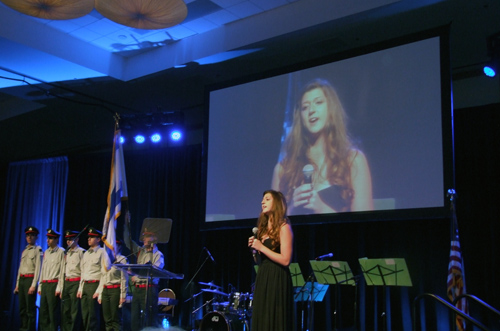
U.S. Naval Chaplain, Capt. Irving A. Elson, led the dinner crowd in the traditional “Ha Motzi” blessing over the bread. Nir Ben Zvi, executive director of the FIDF chapter in San Diego, had current and retired members of both the U.S. and Israeli military stand alongside their tables to be cheered by the crowd. And Israel Navy Capt. Ronen Nimni, currently his country’s Naval Attaché to the United States of America, came from Washington D.C. to introduce Ayalon, whom he noted proudly was “my former commander and the man who promoted me to lieutenant commander aboard my ship in 1992.”
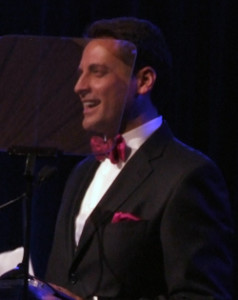
The tenor of the evening’s remarks was presaged by KFMB-TV early morning anchor Dan Cohen who emceed the event at the Hilton hotel which sits on the bay that is home port to numerous ships of the United States Navy. Cohen said that his grandmother was a survivor of Auschwitz, where she was “branded like cattle” with the number 39564, and that his grandfather escaped from Poland at the beginning of World War II. After the war, the family found refuge in Haifa, Israel, from which his grandfather emigrated to the United States in 1960 with his mother, who was present at the dinner. Israel, Cohen noted, is surrounded by enemies, and even in San Diego, at FIDF’s 4th Annual Gala Dinner, “we had to walk through metal detectors tonight to gather as a people.”
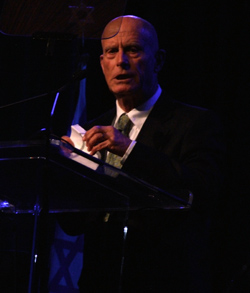
Ayalon took up the theme of refuge, telling the group that even before the creation of the State of Israel, that country’s Navy was formed when Zionists wanting to establish a Jewish State had to run a British blockade in order to settle on the land. Among those blockade runners, he noted, was his own father who came as an “illegal immigrant” to Israel in the 1930s, before the Holocaust.
The man who, during a military career extending from 1963 to 1996, rose to become commander in chief of the Israel Navy and was awarded Israel’s highest military honor, the Medal of Valor, said his most emotional moment in the military did not result from battle, but rather from a rescue at sea. Here is how he described the incident:
As a young commander of a fast patrol boat, in the first months that I commanded this boat, we sailed to north Lebanon and we penetrated the Syrian territorial waters just in order to meet a fisherman that brought to our boat three Jewish children. They were born in Halab, Syria (the region which includes the city of Aleppo). They ran away from Halab without their parents–they sent them because they couldn’t go with them. They arrived in Damascus and then Tartus and from Tartus, with the help of some Mossad agents, they paid money to a Syrian fisherman and he sailed and we met them at sea, in the middle of the night. It was stormy weather, it was raining. Once they came onto the boat, they kissed the deck and they cried. I believe that this was probably the most emotional operation that I took part in, and I remember that exact night, it came to my mind that 35 years earlier my father came as an illegal immigrant, penetrating against the British mandate, and he landed somewhere in the north of Israel. He was not a very emotional person; I don’t think that he kissed the sand of the land of Israel, but I am sure that he felt something different from what he used to feel when he was in Europe.
Ayalon said the challenges that Israel Navy faces today are complex, but they continue to include the necessity of keeping sea lanes to and from Israel open and securing the country against enemy attack. “We have to today defend our energy resources–the gas that we found at sea. We have to go on fighting terror every place and everywhere in which terror exists and most important the Navy today will have to build a strategic deterrence capability in order to deter every future threat on the State of Israel during the 21st Century.”
He added that it is important for Israelis to remember “what our parents wanted to be when they came years ago to build the State of Israel. I believe that their dream was to be the future state that will be a safe home for Jewish people but not less will be a democracy. We should not forget because if we should forget we do not deserve the sacrifice that we demand…”
Three programs of the Friends of the Israel Defense Forces were highlighted during the dinner that had been organized by Jenny Josephson, wife of the FIDF National President and San Diego Chapter President Julian Josephson. These programs were to support Lone Soldiers–who go alone from other countries to volunteer their services to the IDF — to contribute “Impact Scholarships” to help soldiers transition to careers as civilians, and to provide support for Wounded Warriors.
Lt. Hanna Moyal, Sgt. Jason Edney and Sgt. Stav Livnat, three Israeli Lone Soldiers from San Diego, were accorded a standing ovation, as was Sgt. Tal Shabat, who was shot by a sniper through the left eye in 2006 during an IDF operation in Gaza. Shabat was in a coma for 2 1/2 weeks with doctors making the prediction that he would either not survive or would live out life as a cripple. But he went through three years of rehabilitation for memory, physical therapy and communication skills, and learned to walk again. Today, studying interior designing in college as well as how to play the guitar, Shabat, looking like the famed general Moshe Dayan with his eye patch, climbed the steps to the speaker’s platform to cheers, and after narrating his story, advised the assemblage: “Never take time for granted. Never give up when facing a challenge.”
Also speaking was Reserve Lt. Haim Elfasy, who as a result of an Impact Scholarship, was able after his IDF service to study to become an architect. His parents, he noted, were immigrants from Morocco who had been settled in a township south of Beersheba. The family did not have the resources to send him to college, but thanks to the FIDF Impact Scholarsjhip, he said, he is now partner in an architectural firm that recently designed a 240-unit residential concept based upon a Moroccan Casbah. Moreover, he said proudly, he and his partner in the firm–who also had received an Impact Scholarship– have now paid it forward by funding a scholarship for a present-day architectural student who is interning at his firm.
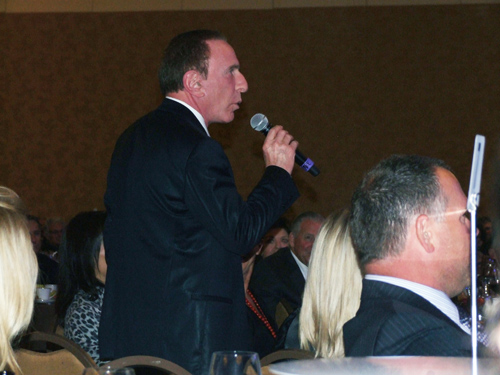
The last speaker at the podium was Julian Josephson, who used the occasion to do some electronic fundraising. When guests arrived for the dinner, they were asked the phone number of their Smart Phones, and later in the evening, those who had such devices received an interactive electronic message by which they could make pledges to the FIDF, and watch the amount being added to a total on a screen behind the lectern.
Josephson said those in the audience who so desired could stand and tell their pledges. Among other donors, one gentleman who had met Shabat in Israel pledged $10,000 in his honor, and a family whose child is a Lone Soldier announced a $2,500 pledge. When Josephson called upon Dr. Shillman, familiarly known as “Dr. Bob,” there was a little byplay between the two men who are known for their generosity. “How much are we short?” asked Shillman. Josephson quickly computed that at that point another $642,000 would bring the total to $1 million, kidding Shillman that he, after all, had just given him the opportunity to ask for such an amount.
In announcing his gift, Shillman said the FIDF “supports the soldiers who give two years if they are girls and if they are boys, three years of their lives to defend their family, and more than their family, they defend their community, their city, their country, and frankly, they support all of the Jews in the world. … In order to show my deep appreciation and my dear wife’s deep appreciation for these soldiers we will commit another $250,000 tonight.”
*
Harrison is editor of San Diego Jewish World. He may be contacted at donald.harrison@sdjewishworld.com